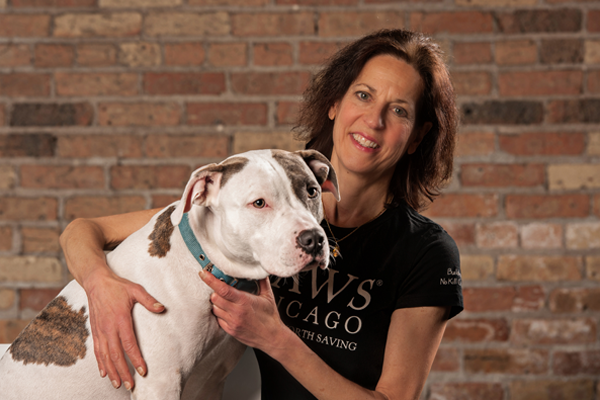Ask the Trainer
by Emily Marron |
Jan 27, 2016
Bully Breed Edition
We all know that the media portrays bully breeds differently, but when it comes to owning one, how different are they from other dogs? Is there anything potential adopters and dog lovers need to know? I sat down with Joan Harris, the Director of Training and Canine Behavior at PAWS Chicago, to find out.
Is there anything people need to consider when meeting a bully breed on the street?
Not any more than any other dog. My feeling is if someone is walking a dog on the street, then you always ask if the dog can be approached before you dive in and approach it.
What about when out on a walk with their own dog?
It’s always proper etiquette for anyone walking his or her own dog to give a wide berth to any other dog. Most of the problems happen when everyone assumes that every dog can be approached. Most dogs can’t be approached on leash and it doesn’t have anything to do with breed. Of course a larger, stronger dog could cause more damage if you made the wrong choice. However, a lot of the little dogs are extremely reactive and vocal, and will bite a dog who comes up. All dog owners should be aware that not every dog wants to be approached.
Do potential bully breed adopters need to know and/or do anything prior to adopting?
First, keep in mind that it’s a big, strong breed. Bully breed temperaments come in a wide range, so you might go in for a bully breed and have the most sweet, mellow, easy dog that doesn’t fit the general standards of a powerful, active dog. Whenever you look at a particular group of dogs you want to make sure that it’s the right fit for you.
Second, consider whether you have the right space for the dog. A lot of housing is prejudice against bully breeds. Generally that’s the biggest barrier for a lot of people. So it is important to check housing rules or limitations.
Finally, think about the temperament you’re looking for. Are you an active person who loves to walk a lot? Are you a person who’s kind of sedentary and wants a couch potato? Are you home a lot? How much do you want to invest in training? All those questions should be answered, and then you can go in and look for the dog of your choice.
What sort of training classes or techniques would you advise someone adopting a bully breed to take?
If you love bully breeds, it’s especially important to have a well-behaved dog because of the stigma and scrutiny they are under. By ensuring your dog has good obedience and is under good control, you are showcasing an ambassador for the breed.
Like any dog, bully breeds can do many different types of training including agility, nose work and high levels of obedience.
What other advice do you have for people looking to adopt or who have adopted a bully breed?
It’s training and making sure your environment and personalities fit. But I would advise them not to get caught up in the stigma of the breed because there’s really good representations of all breeds. Bully breeds are going to be bigger and stronger than many dogs. If they’re looking for a little tiny couch potato breed, they’re not going to be happy with a bully breed of any sort, even a lazy or low-key one. So, make sure that their personality fits a dog of that size.
What are the strengths and things to pay attention to when considering adopting a bully breed?
Strengths: Bully breeds tend to be extremely people oriented, so adoption could be a good choice if you’re looking for a companion to give you a lot of personal attention. They are also often that way with strangers. The sociability of the breed is amazing. If they’ve been well socialized and brought up to love people, they just love all people. Also, if you’re an active person they can keep up with you.
Pay attention: You want to make sure they’re social with other animals. If you have an environment where you’re taking them all over the place, make sure that’s tested beforehand because if they haven’t been socialized well, they can develop prey drive or aggression towards other dogs. The other negative is people’s attitude towards them can affect things. How they’re perceived is important and people are sensitive to that, but I think the benefits outweigh the negatives.

